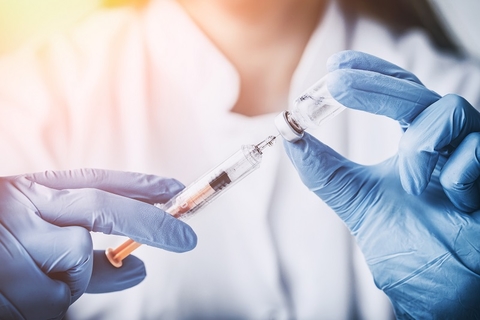Protection against the dominant H3N2 flu strain offered by the coming season’s flu vaccine will still be far from optimal—putting it mildly. And that's thanks to the widely used manufacturing process based on eggs, a new study predicts.
Using a method known as pEpitope, two Rice University researchers analyzed the newly proposed flu vaccine formulation. Their conclusion? An estimated 20% efficacy against H3N2, as published in Clinical Infectious Diseases.
“The vaccine has been changed for 2018-19, but unfortunately it still contains two critical mutations that arise from the egg-based vaccine production process,” said study author Michael Deem, Rice’s John W. Cox Professor in biochemical and genetic engineering. “Our study found that these same mutations halved the efficacy of flu vaccines in the past two seasons, and we expect they will lower the efficacy of the next vaccine in a similar manner.”
Every season, scientists must predict the circulating viruses months ahead so that vaccine producers can produce millions of shots in time. Previously, the biggest worry was that the prediction wouldn't match the circulating strains, making the vaccine less useful in practice.
But recent studies have pointed to the egg-based production process, from which most flu vaccines are produced, making new and forthcoming technology more important.
While manufacturers are culturing the targeted strains in eggs, those viruses undergo structural changes. These unintended mutations wind up making the vaccine strain different from the actual circulating strain, according to Deem.
A previous study by University of Pennsylvania researchers identified the same problem in the 2016-17 season. A CDC interim report, which calculated the 2017-18 season flu vaccines’ efficacy at 25% against the nasty H3N2 strain, also noted that “genetic changes in the vaccine virus hemagglutinin protein that arise during passage in eggs might result in a vaccine immune response that is less effective against circulating viruses.”
Deem and collaborator Melia Bonomo found the original strain used for flu shots in the past two seasons—before the egg-based culturing—was such a perfect match to the circulating strain that it would have led to 47% efficacy in the final product. As the CDC is still compiling final data for 2017-18, the Rice team pegged its real-world estimate at about 19%.
A different H3N2 strain was recommended by the WHO—and adopted by an FDA advisory panel—for inclusion in the 2018-19 flu vaccine for the northern hemisphere. The WHO based its recommendation on the fact that circulating H3N2 viruses were better inhibited by ferret antibodies raised against the newly adopted A/Singapore/INFIMH-16-0019/2016 strain propagated in eggs.
But Deem said the ferret method has been considerably less predictive of human effects over the past 10 years than they had been in the preceding three decades, and they don’t yet know why. In comparison, Rice’s pEpitope method accurately predicted flu shot efficacy results for more than 40 years, according to the study.
Recent doubts about traditional egg-based flu shots could mean more business for vaccines manufactured in cells. These include Sanofi’s recombinant vaccine family Flublok, made in insect cells, and Seqirus’ Flucelvax, which developed in mammalian cells. For the six months ended Dec. 31, Seqirus reported a 504% leap in Flucelvax sales to $308 million.
FDA Commissioner Scott Gottlieb said in February that cell-based flu shots appear “to have somewhat better effectiveness in preventing influenza than the egg-based vaccine,” based on a preliminary analysis of data from the Centers for Medicare & Medicaid Services. The FDA is working with CDC and NIH to fully understand the scientific basis behind it, he added.
In their study, the Rice team predicted efficacy of 47% for an experimental vaccine produced from insect cells. Deem said that reduced efficacy of vaccines seen in the previous seasons will happen again as long as they are produced in eggs.

 902
902


